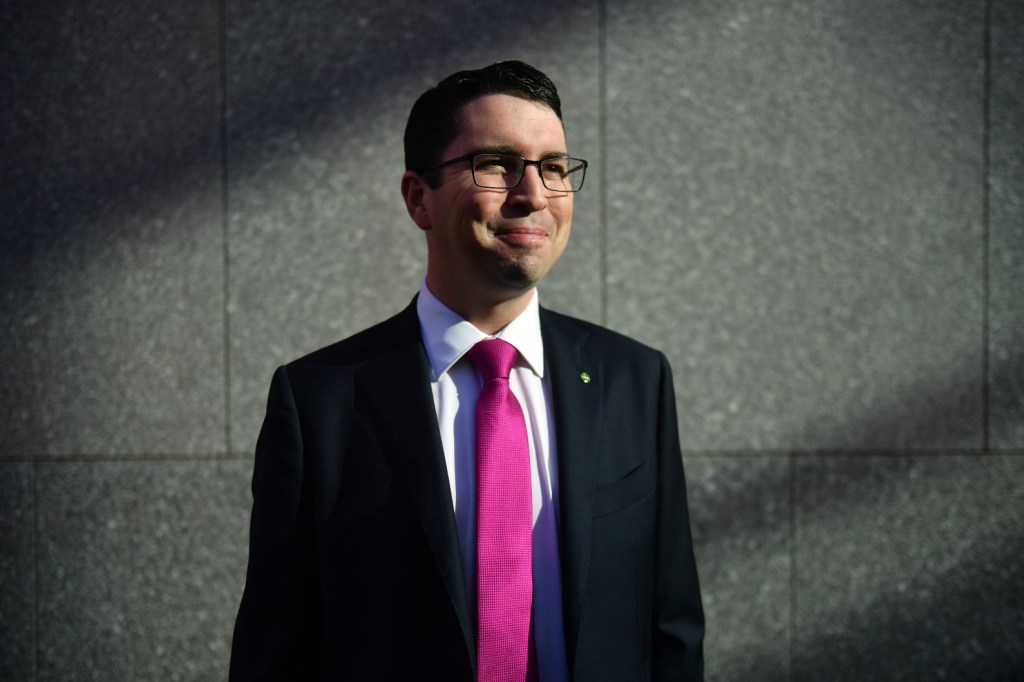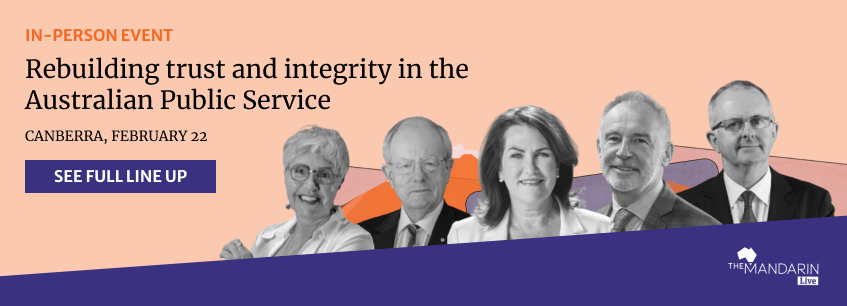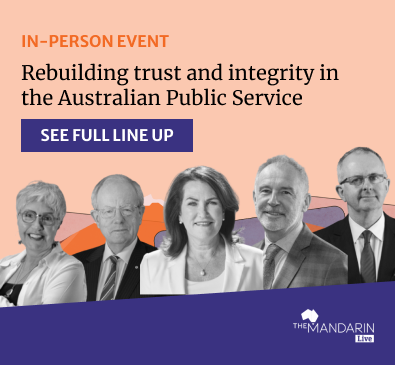
Here is Patrick Gorman’s address to the 2023 graduate class of the APS Academy Graduate Development Program, delivered on December 6.
(Acknowledgements omitted)
Graduates of the Australian Public Service Graduate Development Program, it is my great pleasure to share this memorable occasion with you. Congratulations to each and every one of you on successfully completing the APS GDP.
Today marks the end of one journey, and also the start of a new one. As you complete the Program, you consider how to take the skills and knowledge you have learned, and to apply this into the future.
Ask yourselves: how will your newly acquired capability contribute to policy and programs that will improve the lives of all Australians?
While you are embarking on your own journeys through the public service, the APS is on a journey of its own. Our government is reforming the APS in a number of important ways. Uplifting capability across the APS, to put the work of the public service back in the hands of public servants. The skill and knowledge given by programs like these give a benefit to each of you, and a benefit across the public service, too.
You each bring your own ideas, talent and experiences to the Australian Public Service. And in doing so, you enrich the service as a whole.
History of graduate programs in the public service
You graduate today in an APS which looks very different to the public service of our nation’s early years. Though it cannot feel further away from where we stand today, the story of graduate employment in the APS began on 11 November 1918.
Halfway across the world, the guns fell silent on the battlefields of the Great War. Back at home, Australia began to plan for the repatriation of more than 264,000 service personnel. Australia was only a small country at the time of the First World War, with a population of approximately 4.9 million people. That is just slightly above today’s population of Sydney.
Australia faced huge questions about where these returning service personnel would find employment. The Australian Public Service, for many, was a logical answer. Employment gaps in the APS were quickly filled by returning soldiers.
However, a decade later, the pool of returned service personnel was no longer such a significant staffing resource. The Public Service Board saw an opportunity to uplift the capability of their service by tapping into a new group of people; university graduates. The board’s annual report from 1929 states that the board had “always appreciated the increased efficiency” of employing “highly educated recruits” from universities.
The board committed to:
“… [making] a commencement with the appointment of graduates, a small number of positions having been reserved for this purpose.”
However, this did not come without controversy. Some federal MPs saw the inclusion of graduates in the APS as being at the cost of working-class employment. In fact, Jack Beasley MP argued passionately in parliament in favour of applying the same entrance test to all potential public servants, regardless of education.
He said:
“Let us give them a fair go.
“If these university graduates want to join the Service, let them enter it in the ordinary way — by passing the examination along with the rest of those who have to sit for it.”
Jack Beasley lost that battle; the unique role of university graduate inclusion is now a key part of the APS as we know it.
Irwin Lewis and how far the APS has come
Jack Beasley’s comments back then were valid. The people graduating our universities and entering the workforce typically favoured one particular demographic. Wealthy, white and, overwhelmingly, male.
Australia was still firmly under the White Australia Policy in 1929, and would be for decades to come. Higher education was not an option for the vast majority of women, with the exception of the most wealthy. Both of these facts would remain largely true until the Whitlam government came to power in the 1970s.
However, that does not mean that Australia’s universities did not see their fair share of trailblazers before then. Irwin Lewis’ first day at university in 1957 was probably a lot like many Australian students’ today. The late summer sun was reflecting off sandstone walls. The sweat and glare that greet Australian students today at the start of their semesters.
What was different was the fact that Irwin Lewis had defied all expectations just to be there, at the University of Western Australia. He was the first Aboriginal student to attend university in Western Australia. And he was there just three years after the abolition of the discriminatory native pass system in Perth. From university, Irwin Lewis would go on to a career as a leading public servant.
His life reminds us that all Australians win when we open the doors of opportunity, and that our public institutions can often lead the way. When Irwin Lewis entered the public service, there were few faces like his. Few listening ears that understood the life that he had led to that point.
For Irwin, much like for you all, university was the vehicle to a successful career in the public service. But uniquely for Irwin, he was forging a new path. A path that so many others have now walked.
The APS today and beyond
Irwin Lewis opened a door. To a different perspective in our national policymaking and program implementation. So many of those doors have been opened by people who had to fight against the odds for their place in Australia’s Public Service. And we are a better nation as a result of their unique insights.
Today, Australia’s 170,332-strong public service is much closer to being a mirror of our diverse society. Thanks to so many of these trailblazers.
You can see the change reflected in the APS 2023 Census Data. Women make up 60.4% of the public service. 5.1% of employees live with a disability and 7.7% consider themselves to be neurodivergent. Nearly one in four APS employees’ first languages are not exclusively English. And 23.9% are born overseas. 8.7% identify as LGBTIQA+.
And if Irwin Lewis was a public servant today, he would not be alone. Aboriginal and Torres Strait Islander employees make up 3.5% of Australia’s public service.
The APS has changed since the first university graduates arrived in 1929. It has changed since Irwin Lewis started his studies in 1957. And we are all the better for it. The APS is changing again in 2023, and beyond.
The Albanese government, under minister Gallagher’s leadership, is driving forward an ambitious APS Reform agenda. The people of Australia know that our government can deliver our commitments and can be trusted to deliver transformative reforms to the APS. We know we are ambitious about this. And we are keen to forge a new path with the APS. To open a new door. And just as we saw with Irwin Lewis, we know that Australia will be all the better for it.
Just like Irwin Lewis knew: change does not just happen. It takes hard work. You and I are both at the forefront of this hard work.
Strategic commissioning framework
Our government’s reforms have a strong focus on enhancing capability. The Strategic Commissioning Framework is pivotal to our reform efforts.
Together, we are setting clear expectations that the work of the public service should be done by public servants. We are reducing reliance on external workforces, aligning with our election commitment to bolster the skills of Australian public servants.
Enhanced APS capabilities will benefit both you all as public servants, and all Australians, too. Graduate programs such as these constitute an important part of that capability building.
APS as a model employer
Our government wants the APS to be a model employer. It is one of the pillars of the reform work we are implementing. First Nations employment is one area of particular focus. The First Nations Unit at the APSC is doing incredible work.
The SES 100 program seeks to ensure that we have more First Nations representation at all levels of the APS. By encouraging First Nations representation in the Senior Executive Service, we can ensure that meaningful inclusion and cultural learning occurs at all levels of the APS.
The APS is at its best when it brings people together for that common purpose. To make sure Australia’s public service is able to deliver policy and programs which uplift the lives of all Australians. And it is at its best when the people it brings together reflect and deliver for our wider Australian society.
APS employee value proposition
The recently launched APS Employee Value Proposition encapsulates the career you are stepping into. It is a career with purpose and meaning, regardless of what you do with it. From Prime Ministers and ambassadors, to the people on the frontlines in service delivery, all public servants share a common purpose. A commitment to serving the Australian people. It is something special that comes from time in the APS. And it is that drive to make the “fair go” a reality which unites us as Australians. You are part of something greater than yourself, with the power to positively impact lives across Australia. But there’s also something in it for you – I promise!
The APS offers you career-long opportunities for growth. You will gain new skills, experience diverse challenges, and have access to learning and development along the way. As you venture further into your APS careers, I encourage you to embrace the values of teamwork, dedication and integrity. Be consistent in your efforts, collaborate with your colleagues, and keep learning and growing. Strive to make your mark and to be part of a team that plays a crucial role in shaping Australia’s future.
Today’s graduates
The 2023 cohort is 285 graduates strong. Although you share a common achievement, you are all from different walks of life. Not all graduates can be here today, but you have been coming together throughout the year in different ways. Representing 23 agencies as one APS graduate cohort.
Though you are one cohort, you are also spread across 12 working locations all over the country.
From Penrith to Perth.
From Geelong to Griffith.
Of the group in front of me today, there are not just a select group of talented female university graduates; there is a majority. There is not just one First Nations trailblazer – there are half a dozen just here with us today. There are people who identify as neurodiverse, or part of the LGBTQI+ community. People who have so historically been excluded that, back in 1929, Jack Beasley never would have imagined the “fair go” would reach you.
It is a valuable opportunity to represent your unique communities and backgrounds through your work.
Where to next?
As Australian Public Servants, you join a new community. A community of people who have made lasting positive impacts on Australian society. Some current and former public servants are widely celebrated for their work in the APS. Some have taken the skills and knowledge they have learnt in their time in the public service and applied it roles in other industries. For many, the opportunities of learning and developing skills in the APS have opened doors across the world. A few have even become Prime Minister.
There are truly no limits to what any of you can achieve. Whether this is just the beginning of a long career in the public service. Whether you try your hand at working in a Ministerial office. Or even whether you decide that this isn’t the career for you. The skills and knowledge you have accumulated so far will serve you well in whatever the future brings.
I see a group of people in front of me who have worked hard, honed their craft and learnt so much. You are a larger team than last year, numbers have grown by 30%, but the calibre is equally strong. The best and brightest are selected to carry forward the APS from across Australia. And I, for one, cannot wait to see the mark that each of you will make on Australia.
As you share the valuable skills and knowledge you have learnt, across your agencies and across the continent, you contribute to uplifting capability. As you contemplate the next steps in your career, take a moment to reflect on your achievements.
The program has pushed you out of your comfort zones, immersing you in the makings of an excellent public servant. Over the past 10 months, you have laid the foundations for meaningful and impactful careers in the Australian Public Service. Careers in which you can serve the Australian community and help shape Australia’s future. Careers where your existing experiences and knowledge can combine with your newfound capability to make life better for so many Australians.
So many in the APS find purpose in what they do. In the most recent APS Employee Census, 92% of respondents understand how their role contributes to achieving an outcome for the Australian public. Eighty-four percent of Census respondents agreed they believe strongly in the purpose and objectives of the APS. And 76% agreed they gained a sense of accomplishment in their job.
These are not careers to be found anywhere. I encourage you to think of your career in the APS as an opportunity to choose your own adventure. In the APS, every career choice opens up new paths, each as unique and exciting as the next.
So, gear up for a journey that’s as diverse and dynamic as the APS itself. You stand at the opening line of the story of your career in the public service. It is also the start of a new chapter for the APS. There has never been a better time to be at the forefront of this momentous change. The future of the public service is dynamic, and your adaptability will be key. In the APS, as is often the case in life, success depends on teamwork. It is for this reason I encourage you to connect with your peers and build relationships that support your learning and career. These bonds can be lifelong and instrumental in your professional journey.
Remember, being a public servant is not just a role; it’s a commitment to serve with the highest level of integrity. It means being honest, transparent, accountable, impartial, and unbiased, always putting the needs of the community first. It means realising that you are a unique part of a greater purpose. A greater journey that started 123 years ago. A journey that people like Irwin Lewis worked hard to make available to all Australians. It is one that will benefit from your insights, experiences and capabilities. Especially from those unique contributions that only you can bring to the table. I encourage you to keep learning, to keep developing.
All Australians deserve an APS that reflects the standards and diversity that they would expect.
All Australians deserve an APS that invites them in through an open door.
Conclusion
I will end where I began, by congratulating you, our newest public service champions. You have been selected for this Program, and can play the role of changemakers in your own departments and areas of expertise. Your energy and investment into this program helps bring important shifts.
Shifts that position us as contributors to solving some of the key challenges of our time. And position Australia for success with and in its public sector. You can bring about that positive impact on the APS and all Australians.
I wish you all the very best with your careers ahead.
UPCOMING EVENT:
READ MORE:

